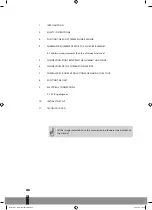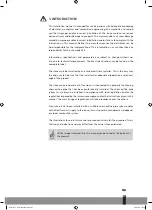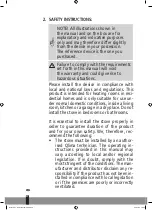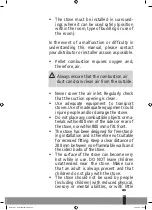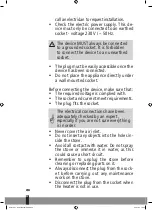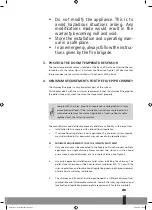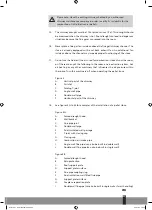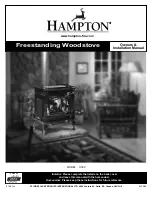
51
Data on minimum requirements for
chimney dimensions
Internal dia-
meter of the
flue channel
80 mm
Internal dia-
meter of the
flue channel
100 mm
Minimum vertical length of the chimney
2.5 m
2.5 m
Maximum vertical length of the chimney
7.0 m
10 m
7.0 m
10 m
Maximum vertical chimney length in the
case of two perpendicular curves (90°) and
a T-joint
5.0 m
8.0 m
Maximum number of perpendicular curves
(90º)
3
4
Maximum horizontal length
2.0 m
2.0 m
Minimum horizontal inclination of the
part for combustion gases
5°
5°
Table 1: Overview of the chimney/flue channel dimensions.
G
If more than one curve or T-joint is installed in the chimney, for each
additional element the maximum vertical height must be reduced by 1 m.
Sample:
A T-joint and two 90° bends is fitted in a chimney with an internal diameter of 80
mm. Therefore, the chimney has a maximum height of 5 m, although the table
shows that the chimney channel with a T-joint can reach a maximum height of 7
m. Two additional curves are fitted in such a way that the chimney is 2 m lower,
therefore 7 m - 2 m = 5 m.
5. CONNECTION POINT BETWEEN THE CHIMNEY AND STOVE
The chimney can be connected to the 80 mm pipe on the back of the stove (see
the pipe circled in figure 5). Ensure that the pipe is connected in such a way that
no smoke can escape. See chapter 4 for requirements of the chimney and materials
to be used.
6. CONNECTION OF THE COMBUSTION AIR PIPE
• Make sure that the position of the fresh air inlet always complies with
local legislation!
• Make sure that the fresh air inlet for combustion gas is covered, for
example, by a grille that prevents accessing it.
Connect a 50 mm rubber pipe or similar conduit to the combustion air inlet at the
back of the stove, see figure 6. The other end of this rubber pipe or similar channel
must draw in clean air from the outside. See figures 3 and from 4A to 4E.
4
Instal_man_ECO1700('20)V6.indd 51
Instal_man_ECO1700('20)V6.indd 51
30-07-20 16:54
30-07-20 16:54




